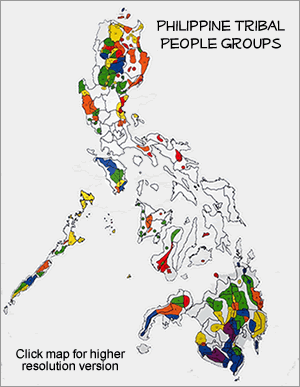Itneg is an alternate name of Tinguian. Tinguian means "the people of the mountains," It was originally used to refer to all mountain dwelling people. These days it is particularly used to refer to a cultural minority group occupying the mountains of Abra. The Tinguian are listed as one of the Cordillerean people called "Igorots." Some feature of the culture, customs, traditions, rituals, beliefs and ethnic values are the same with the Igorots.
The Itnegs or Tinguian peoples are divided into several sub-groups by dialectical differences. One of these is the Binongan.
Binongan Tinguian people live in scattered villages and cover a large area. Most of them live in settlements usually found near riverbanks. Dwellings are usually built in clusters with rice granary and vegetable patches. Two or three adjacent settlements generally compose a village.
A Binongan Tinguian village is usually headed by one of the old men or "lakay" chosen by a council of elder members of the village. A "lakay" is chosen based on his courage, health, wisdom and character. His role is to settle disputes in accordance with the customs and traditions. If a dispute is serious or the problem is new, he calls the council of elders or heads of influential families to discuss and decide with him.
Music is an important aspect of Binongan Tinguian culture. Singing is a normal occurrence in the community and in the work fields. Their musical instruments are the "kalalent" (nose flute) the gangsa (copper gongs) and the "kulintang" (guitar).
Economic life is based on agriculture. It is the principal source of income. Agricultural products are rice, camote, yams, corn, squash, ginger, melon, sugar cane, fruits, and good quality cotton and tobacco. Aside from being farmers, they also do freshwater fishing, weaving various types of cloths and blanket, pottery making, and basketry.
Traditional religion is based on beliefs in the spirits or anitos, locally called "sasailo" who are natural deities, leader spirits (good or bad), and ancestral spirits. Spirits are revered and feared. They have adopted certain measures to protect themselves and property. They conduct ceremonies, offer food and drinks, and perform magical acts to ill-disposed spirits to assure good harvests.
Binongan Tinguian are also influenced by education and the Christian religion. During the fifties and sixties, they faced an identity crisis. But due to the new government policy on indigenous people and cultural minorities, many of the Tinguian elders and professionals with the help of concerned groups tried to revive the cultural traditions and maintain/keep the Tinguian identity which they can be proud of.
The Spanish Augustinian missionaries started work in the mountains of Abra and converted many Tinguians. Historians write that many towns and districts are now recognized as Ilocano and have Christianized Tinguians. Some of the Catholic teachings accommodated and combined with indigenous beliefs and practices. Present day Tinguians are Christian, but they have not totally put aside their worship, beliefs and superstitions centering around the "sasailo" concept. They reconcile their traditional faith with Christianity. They now believe in one supreme being who creates and controls life. The lesser spirits are said to be similar to the patron saints of the Catholic Church. Like the Catholics, they worship and ask intercession for the religious observances that go with various paraphernalia, bamboo arches, Basi (drink offerings), and musical instruments. Protective necklaces are used by children. Cults are in the area.
Pray for believers to continue their walk with Christ and grow in their faith.
Large portions of Tinguians are yet to be reached. Pray for culturally sensitive workers to continue reaching this people. Ilocano believers near the area to reach out this people.
Pray for New Testament to be distributed, read and understood by the Binongan Tinguian.
Cults are very active in the area. Pray for the Binongan Tinguian to have the spiritual discernment to stand with Christ.
Scripture Prayers for the Itneg, Binongan Tinguian in Philippines.
http://www.ethnicgroupsphilippines.com/ethnic-groups-in-the-philippines/itneg-tingguian/
https://en.wikipedia.org/wiki/Itneg_people
Asia Missions (AMNET)
| Profile Source: Joshua Project |











